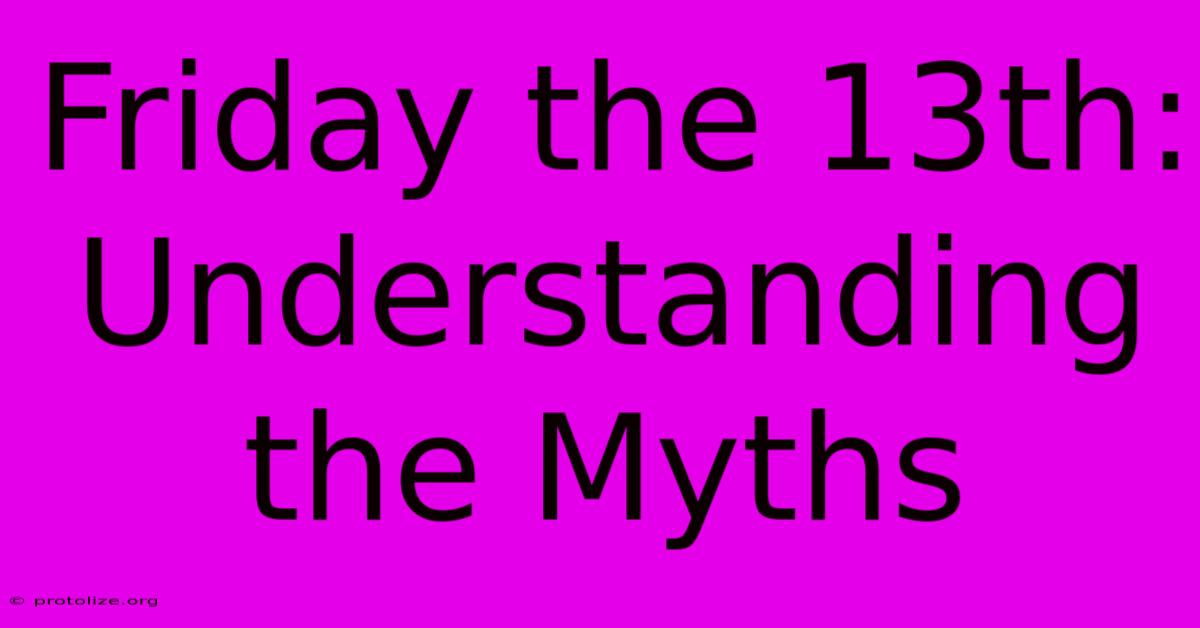Friday The 13th: Understanding The Myths

Discover more detailed and exciting information on our website. Click the link below to start your adventure: Visit Best Website mr.cleine.com. Don't miss out!
Table of Contents
Friday the 13th: Understanding the Myths and Superstitions
Friday the 13th. The phrase alone conjures images of black cats, broken mirrors, and unfortunate events. But where does this pervasive superstition originate? Is there any real basis for the fear, or is it purely cultural phenomenon? Let's delve into the myths and history behind this infamous day.
The Roots of Friday the 13th Phobia: A Blend of History and Folklore
The fear of Friday the 13th, known as friggatriskaidekaphobia, is a complex tapestry woven from threads of historical events, religious beliefs, and cultural narratives. While pinpointing a single origin is impossible, several contributing factors stand out:
Christian Mythology and the Number 13:
The number 13 itself holds significant weight in Christian mythology. The Last Supper, featuring 13 attendees (Jesus and his 12 disciples), is often cited as a precursor to the betrayal and crucifixion of Jesus. This association cemented 13's negative connotation in many Christian cultures.
Norse Mythology and Friday:
Friday's association with misfortune stems partly from Norse mythology. Frigg, the goddess of love and beauty (from whom the day "Friday" derives its name), was associated with death and misfortune, adding to the day's already burdened reputation.
Historical Events and Superstitions:
Throughout history, various events coinciding with Friday the 13th have fueled the superstition. While correlation doesn't equal causation, these unfortunate occurrences helped cement the day's ominous reputation. It's important to remember that these are anecdotal and do not support a causal relationship between the date and the events.
Debunking the Myths: Is There Any Real Basis for the Fear?
While the fear is deeply ingrained in many cultures, there's no scientific evidence to support the claim that Friday the 13th is inherently more dangerous or unlucky than any other day. The perception of increased misfortune on this day is largely a matter of confirmation bias – we tend to remember and focus on events that confirm our existing beliefs.
The Psychology Behind the Fear:
The fear of Friday the 13th is a prime example of a psychological phenomenon. Anxiety surrounding the day can lead to self-fulfilling prophecies, influencing behavior and potentially increasing the likelihood of accidents or negative experiences due to increased stress and heightened awareness.
The Power of Suggestion and Social Influence:
The widespread belief in Friday the 13th's bad luck contributes significantly to its impact. The collective anxiety surrounding the day can create a self-perpetuating cycle, with expectations of misfortune shaping our experiences and reinforcing the belief.
Managing Friggatriskaidekaphobia: Tips for Overcoming the Fear
For those who genuinely struggle with friggatriskaidekaphobia, several coping mechanisms can help manage and alleviate anxiety:
- Acknowledge and Understand the Fear: Recognizing the origin of the fear, its irrational nature, and its psychological basis is the first step towards overcoming it.
- Challenge Negative Thoughts: Actively counter negative thoughts and beliefs associated with Friday the 13th with rational and positive affirmations.
- Practice Mindfulness and Relaxation Techniques: Techniques like deep breathing, meditation, or yoga can help manage anxiety and stress.
- Focus on Positive Aspects of the Day: Consciously shift your focus to positive events and aspects of the day to counteract negative expectations.
- Seek Professional Help: If the fear significantly impacts your daily life, don't hesitate to seek professional help from a therapist or counselor.
Conclusion: Embracing Friday the 13th
Ultimately, Friday the 13th remains a fascinating example of how cultural narratives, historical events, and psychological factors can shape our beliefs and influence our experiences. While there's no rational basis for the fear itself, understanding its origins and employing coping mechanisms can help us approach the day with a more rational and less anxious perspective. So, the next time Friday the 13th rolls around, remember the fascinating history behind the superstition and choose to focus on the positive!

Thank you for visiting our website wich cover about Friday The 13th: Understanding The Myths. We hope the information provided has been useful to you. Feel free to contact us if you have any questions or need further assistance. See you next time and dont miss to bookmark.
Featured Posts
-
Prepare For Snow Squalls Safely
Dec 13, 2024
-
Analyzing Rams Win Top Performers Weak Links
Dec 13, 2024
-
Erp Software Store Keeper
Dec 13, 2024
-
Bramnicks Position Nj Drone Issue
Dec 13, 2024
-
Solitude A Netflix Series Review
Dec 13, 2024
